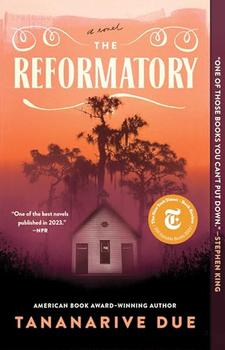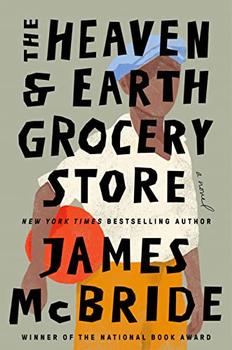Summary | Excerpt | Reading Guide | Reviews | Beyond the book | Read-Alikes | Genres & Themes | Author Bio

A Novel
by Tananarive DueGracetown, Florida in 1950 is deep in the Jim Crow South and home to the Gracetown School for Boys, a reformatory school with a dark reputation. After kicking a white teenager while defending his older sister Gloria, Robert Stephens Jr., a Black 12-year-old, is sent to Gracetown, where he is thrown into a world of ghosts, brutal punishments and a superintendent with dark motives and darker secrets. Desperate to save her brother, Gloria pushes back against the blatant racism of her town to fight for Robert's freedom and her own safety. Based on true events at the Arthur G. Dozier School for Boys in Marianna, Florida, The Reformatory is a story of the horrors of the Jim Crow South and a pair of siblings who would walk through hell to get back to one another.
Author Tananarive Due puts a supernatural twist on her brutal tale through the inclusion of haints. These ghosts of boys and men who died at Gracetown add another layer of pain and fear to Robert's narrative, as seeing the haints forces Robert to recognize what could be in store for him if he doesn't escape. This setting—haunted by the spirits of those who have died there, whose ghosts are visible only to one increasingly desperate young boy—may remind readers of Stephen King's The Shining. However, in King's novel, the ghosts are the horrors, whereas in the case of Gracetown, the humans are the true monsters. Due's descriptions of Superintendent Haddock, whose appetite for violence and fear is unmatched, and Boone, Haddock's right-hand man who treats the boys little better than animals, make it clear that they're perceived one way by society while the inmates of the school see their true faces. This deception is all too common for individuals in power, yet its revelation is still terrifying.
Authority figures like Haddock and Boone were, sadly, commonplace in reformatory schools of the early and mid-1900s. In an interview with Medium, Due, who's been working on this novel since 2013, shared that the grief and horror of her research into Dozier, juvenile incarceration and 1950s Florida civil rights history almost led her to quit the project numerous times. Her writing passes those horrors along to the reader. Not shying away from savage imagery—at one point during Robert's first beating, he realizes that "the tiny dark dots in random patterns were not mud…blood patterns were sprayed like paint droplets against the dull planks…he would bleed here…his blood would fly"—Due brings to life the brutality that both Robert and Gloria face in their respective situations. For Robert, a careless word or phrase could lead to starvation, severe beatings and possibly even death, while Gloria's efforts to free Robert stir up the town's simmering racism, endangering her home and even her life. Due's writing is engaging and fast-paced, creating a tension that will keep readers absorbed even while they're repulsed by the atrocities Due describes.
The author's personal connection to her story raises the emotional stakes, too. Robert Stephens Jr. is named after Due's great-uncle, who died at Dozier in 1937 at the age of 15 (see Beyond the Book). Due had never heard of her great-uncle until recovery efforts at the school in the 2010s, but after hearing his story, she knew she had to give him a chance for a different story in her fiction. Gloria, Robert's older sister, and John Dorsey, the NAACP attorney who works with Gloria in an attempt to free Robert, are named after Due's mother and father, respectively. Both Patricia Gloria Stephens Due and John Due were civil rights activists and have been inducted into the Florida Civil Rights Hall of Fame. Miz Lottie, the elderly women who serves as guardian for Gloria and Robert after their father flees Gracetown in the wake of false rape allegations, is named for Lottie Stephens Sears Houston, Due's grandmother who was married to Robert Stephens's brother. In that same Medium interview, Due revealed that her novel also includes other references to her family in her characters' various attributes and quirks. By using family names and other allusions to her loved ones, Due shares the history not only of Dozier but also of her family, who, like the fictional Stephens family, were significantly affected by the terrors of the Jim Crow South.
In a case of truth being more horrible than fiction, The Reformatory is equal parts historical fiction, paranormal horror, social commentary and personal history, and is worthy of the time and tears Due put into her novel.
![]() This review was originally published in The BookBrowse Review in November 2023, and has been updated for the
October 2024 edition.
Click here to go to this issue.
This review was originally published in The BookBrowse Review in November 2023, and has been updated for the
October 2024 edition.
Click here to go to this issue.

If you liked The Reformatory, try these:

The Heaven & Earth Grocery Store
by James McBride
Published 2025
From James McBride, author of the bestselling Oprah's Book Club pick Deacon King Kong and the National Book Award–winning The Good Lord Bird, a novel about small-town secrets and the people who keep them.

by Raul Palma
Published 2024
A genre-bending debut with a fiercely political heart, A Haunting in Hialeah Gardens explores the weight of the devil's bargain, following the lengths one man will go to for the promise of freedom.
What really knocks me out is a book that, when you're all done reading, you wish the author that wrote it was a ...
Click Here to find out who said this, as well as discovering other famous literary quotes!
Your guide toexceptional books
BookBrowse seeks out and recommends the best in contemporary fiction and nonfiction—books that not only engage and entertain but also deepen our understanding of ourselves and the world around us.